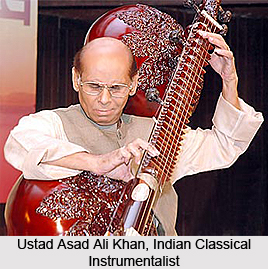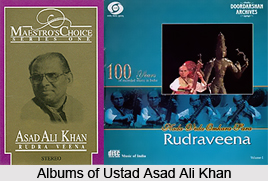 Ustad Asad Ali Khan can be called the man behind rudra veena`s persisting stature, who religiously believed that this instrument could do wonders when played soulfully. He belongs to an extraordinary lineage of musicians, people who were even venerated by the emperors. And owing to such illustrious background, Asad Ali is but naturally gifted with talent to continue. He was exhaustively trained by his father from a young age, the fruits of which can be seen in the present ages. The gharana, which he specializes in, is unequalled in tonal qualities of a rendition. He is excelled in any instrument he plays, be it the sitar or the rudra veena, and possesses the unusual quality to oscillate from a sweetness of tone to severe masculinity in the playing
Ustad Asad Ali Khan can be called the man behind rudra veena`s persisting stature, who religiously believed that this instrument could do wonders when played soulfully. He belongs to an extraordinary lineage of musicians, people who were even venerated by the emperors. And owing to such illustrious background, Asad Ali is but naturally gifted with talent to continue. He was exhaustively trained by his father from a young age, the fruits of which can be seen in the present ages. The gharana, which he specializes in, is unequalled in tonal qualities of a rendition. He is excelled in any instrument he plays, be it the sitar or the rudra veena, and possesses the unusual quality to oscillate from a sweetness of tone to severe masculinity in the playing
Ustad Asad Ali Khan As a Musician
Of the living exponents of the rudra veena today, Ustad Asad Ali Khan is the most distinguished. He is the son of Ustad Sadiq Ali Khan, the descendant and disciple of the renowned Ustad Rajab Ali Khan. His forefathers were illustrious representatives of the Beenkar Gharana of Jaipur, especially his grandfather Musharaff Khan, who was a musician at the Alwar court. This gharana has close links with the Senia Beenkar gharana, associated with Jaipur. Ustad Rajab Ali Khan, besides being proficient in the rudra veena, sitar and dilruba, was also a widely respected singer whose music influenced even Ustad Amir Khan. The king of Jaipur was not only his patron, but also a student of his. Asad Ali`s grandfather Musharaff Khan`s musical genius was so highly respected that his patron, the king of Alwar, gifted him a village freed from the burden of tax and also a hefty monthly salary of 500 rupees. Interestingly, it is said that Musharaff Khan was the first Hindustani musician to make a journey to foreign lands. Even the illustrious Ustad Wazir Khan of Rampur court held him in extremely high esteem.
 In all, Asad Ali Khan`s family members were rudra vainiks for seven generations with him being the last one in the line. His father Sadiq Ali served in the Alwar court at first and moved to the Rampur court. It was at Rampur that Asad Ali was initiated into the instrument by his father, when he was just six. Fourteen hours of practice every day for 15 years in a stretch - such was the painstaking discipline he was put through until the rudra veena itself became a part of his existence. His father forbade him from stepping onto the concert platform without achieving the extraordinary level of perfection required to handle the instrument.
In all, Asad Ali Khan`s family members were rudra vainiks for seven generations with him being the last one in the line. His father Sadiq Ali served in the Alwar court at first and moved to the Rampur court. It was at Rampur that Asad Ali was initiated into the instrument by his father, when he was just six. Fourteen hours of practice every day for 15 years in a stretch - such was the painstaking discipline he was put through until the rudra veena itself became a part of his existence. His father forbade him from stepping onto the concert platform without achieving the extraordinary level of perfection required to handle the instrument.
Asad Ali Khan and his ancestors belong to the khandar-bani of dhrupad, which is mentioned in music treatises to be one of the four banis of dhrupad. The khandar-bani derive its name from a very strong and sharp knife used in Rajasthan called khanda. Like the sharp knife, the tonal quality of the music produced by this gharana is known to be keen and lively. While these are the traditional dimensions of the gharana, Asad Ali`s individual style combines the sweetness of sitar with the stateliness of rudra veena. Asad Ali`s jod-alaaps are a delight to listen to. Their rhythmic quality, the excellent altering of melodic and contemplative passages while playing jod, makes them amazing experiences. His flawless sense of melody allowed him to bring in the soft shades and delicate hues of shringar when rendering raagas like Shudh Sarang, Bihag or Khammaj. Yet, at the same time, he can be vigorously masculine while playing the rhythmic section. Unlike Ustad Z.M. Dagar, Asad Ali lays greater stress on the dhrupad section where he surpasses in his dialogue with the pakhawaj. His bol-baant section possesses a powerful thrusting quality. His ability to evoke both the tender and the tremendous on the instrument makes his supple approach closer to ardhanarishwara bhava or the androgynous character of the rudra veena.
As with Ustad Z.M. Dagar, only very few recordings of Asad Ali are available in the market. Of these, the early Mian ki Todi brought out by HMV is a concise example of his art. The Malkauns and Asavari as also the Lalit and Darbari, gives one a powerful glimpse of his vast art, together with his peerless mastery over the instrument. Asad Ali, a master of many stringed instrument, himself teaches the sitar to numerous students. But unfortunately, he has not been able to pass on his art to any student of equivalent stature. His being the last unparalleled rudra vainik in this country would have one ponder over the instrument`s future, as also the continued life of the inheritance he so unremittingly perfected and polished.




















